 |
Faith under Attack
Americans Think Hell Exists,
But No One Goes There
Marian T. Horvat, Ph.D.
Does the modern man still believe that there is life after death? Or in a Heaven and Hell? It may come as a surprise to many, as it did to me, to hear that an overwhelming majority of Americans say that they believe in a life after death, as well as the existence of Heaven and Hell.
According to a new study, 76% of Americans believe in Heaven and 71% in Hell. (1) Of course, there are eclectic views of what such places are. For example, 39% described Hell as a “state of eternal separation from God’s presence;” 32% called it “an actual place of torment and suffering,” and 13% hold it is merely a “symbol” of some “bad outcome after death.” There was a variety of opinions about Heaven also, reflecting the individualism inherent in the basically Protestant U.S. culture, which confers a supposed “right” for each individual to define the truth as he sees it.
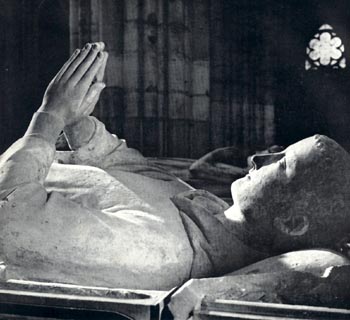
The good Catholic prepares his soul for death and peacefully faces God and Judgment. Above, the tomb of the son of St. Louis IX in the Abbey of Royaumont. |
A 2003 Harris Poll that surveyed 2,200 U.S. adults found similar results: 82% believed in Heaven, 69% believed in Hell, and less than 1% thought they could go to Hell. “The Harris Poll, #11, February 26, 2003”, Harris Interactive Internet site.
But now for the more astounding statistic: Of all those folks who still purport to believe in Hell, only one-half of 1% thinks that they could possibly be going there. That is to say, everyone is going to Heaven, and virtually no one will be in Hell. For all practical purposes, Hell might as well not exist.
Sadly, this general view prevails even among Catholics, despite the teaching of the Church, which states that those who die in the state of mortal sin will be judged and condemned to Hell, a place, an abode of everlasting torment. It is filled with the enemies of Christ (Ps. 109:1), those who refuse to believe in the Gospel (John 3:18), the impure, thieves, the covetous, blasphemers (1 Cor 6:10), and many of the great on this earth (Matt 19:30), among others. Hell not only exists, therefore, but would be well populated, as Scriptures itself affirms: “Enter ye in at the narrow gate: for wide is the gate, and broad is the way that leads to destruction, and many there are who go in thereat.” (Matt 7:13)
A bad catechesis
Why, then, do so many American Catholics adopt the sanguine view that no one goes to Hell? Tongue in check, I pass over the possibility anyone could suppose people have become more saintly than in the past and have stopped committing mortal sins.
The next possibility seems to be true. Such optimism is being fed by the poor catechesis and teaching on the Four Last Things - Death, Judgment, Heaven and Hell - since Vatican II. The progressivist view of Hans Urs von Balthasar on universal salvation, for example, has become mainstream thinking, even among so-called conservative Catholic scholars today. Von Balthasar boldly queried that since the Redemption of Christ was sufficient to have saved all sinners, why should it not be so? In the end, he proposed, one can entertain the possibility that Hell, should it exist, is vacant (Dare We Hope?). Instead of sternly repudiating this thinking, Pope John Paul II in a certain way accepted it in his own work Crossing the Threshold of Hope (end of chap. 28).
Another progressivist favorite, Fr. Karl Rahner, S.J., assures us that the dead are not suffering, or even really gone:
“They do not leave us. They remain! Where are they? In darkness? Oh, No! It is we who are in darkness. We do not see them, but they see us. Their eyes, radiant with glory, are fixed upon our eyes…. Oh, infinite consolation! Although invisible to us, our dead are not absent… They are living near us, transfigured … into light, into power, into love.”(2)
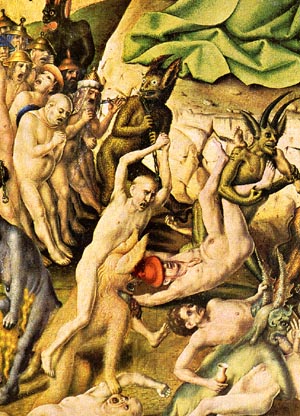
Progressivist Prelates may be shocked to find - perhaps too late! - that Hell exists. Above, a Cardinal is dragged by the devils to Hell in a 12th century painting. |
Supported by these sham progressivist buttresses, parish priests and religious have taken up the practice of assuring the faithful that all are in Heaven, or on the way there. Variations on this theme abound in Catholic periodicals in the month of November, with its feasts of All Saints and All Souls. Here is a typical fare, a meditation on death by Fr. Ron Rolheiser for the faithful of Los Angeles (The Tidings, November 14, 2003):
“Imagine dying a sudden death by an accident or heart attack. One minute you’re alive, tangibly connected to family, friends, a home, a routine, a healthy body, plans for a future, an anticipated dinner that evening, your favorite sports team on a wonderful playoff fun … The next minute you’re on the other side. In Heaven, yes, but in one instant stripped of everything you’ve drawn your life from. You’re in God’s arms, secure, loved, forgiven...”
According to this increasingly common preaching, a man suffers a sudden death, and he automatically goes to Heaven. One minute you’re on earth, the next you’re in Heaven in God’s arms. There is no mention of a judgment, of a possible Hell. It is to all appearances a very comforting notion, but in the end, only that, a deceptive and even devious fiction. Perhaps one of Satan’s greatest triumphs is the fact that he has managed to convince people that no one is going to Hell, if it even exists.
The Letter from Beyond, which follows below for TIA’s readers, is a salutary meditation on death quite different from the example above. It is the story of a young woman, Anne, who met an unexpected death, faced God at her private judgment, and was condemned to that terrible forever of suffering in Hell. Anne relates her fate in a letter, which she delivers to a friend, Claire, in a dream.
You can imagine Claire’s shock. She had heard the news about her friend’s car accident and sudden death only that morning. It upset her since she realized Anne was not a good Catholic, and she said some prayers for Anne’s soul. Then, that night, she had a dream, so vivid it seemed real. In it, Anne delivered a letter addressed to her. Do not pray for me, the letter read, for I am condemned. I didn’t take God seriously. I didn’t take advantage of the many graces He gave me in this life. I made a god of pleasure, of my own self-satisfaction and whims, of the good things of this life. And now I am suffering an afterlife of eternal torment.
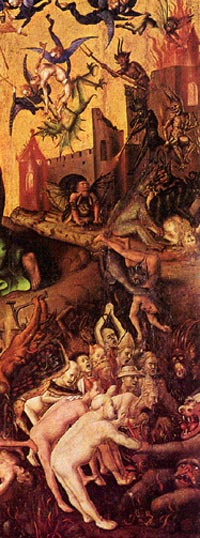
St. John Chrysostom: “He who despises Hell or forgets it will not escape it.” Detail, Last Judgment, Lochner |
I will stop here, and let you read the rest.
The story, doctrinally sound, cannot be dismissed merely as a fiction and dream. God communicates to men in many ways and the Church has authorized many divine communications made in visions as well as dreams. Analogously as in Sacred Scriptures God often made use of dreams to warn men of dangers, God continues to forewarn man by means of dreams. It would seem that the Letter from Beyond could well be one of these cases. The diocesan Curia of Treves (Germany) authorized its publication in 1953 as highly instructive and faithful to Catholic teaching. Later Fr. Bernhardin Krempel, C.P., Doctor in Theology, added footnotes demonstrating its absolute concordance with the doctrine of the Catholic Church.
Certainly the warnings in this dream are both extremely salutary and timely. Now, more than ever, it is necessary to remind Catholics of the existence of Hell, since so many live as if the truths of the Faith do not exist. After you read it, I invite you to share it with friends or relatives who have lapsed from the practice of the Catholic Faith or living in the state of mortal sin. Perhaps the reading of this letter will cause them to stop and reflect on the eternal fate reserved for the impious in the next life. Who knows if thinking about the fires of Hell will not excite in their hearts a holy fear that will lead them to change their lives?
Scriptures recommends a constant meditation on the last things to keep us from sinning: “In all thy works remember thy last end, and thou shalt never sin (Eccles 7:40). The Saints and Doctors of the Church counsel us to think often of Hell. St. Bernard said:
“Often go down to Hell during your lifetime, so that you will not have to after death.”
Or the words of St. John Chrysostom:
“He who despises Hell or forgets it will not escape it.”
Instead of encouraging inconsistent hopes that Hell is unpopulated, the Church wisely counseled her children to mediate often on it, knowing that many would abandon the path of sin by thinking about those devouring flames, those horrible torments that the human tongue cannot express.

Letter from Beyond
With notes by Fr. Bernhardin Krempel, C.P., Doctor of Theology
What follows is the faithful translation from the Portuguese edition of the work titled Letter from Beyond, published by Artes Gráficas Armando Basílio and distributed by Livraria Clássica Brasileira.
On the first page of the original German edition of 1953 are these words of approbation: “Imprimatur of the orginal German: Brief aus dem Jeneseits: Treves, 9/11/1953. N. 4/53. Ecclesiastical approbation of this work: Taubaté – Est. de São Paulo – 2/11/1955.
An Introduction by Claire
The following explanation was found among the papers left by a nun who died in a convent in Germany.
In my youth, I had a friend, Anne, who lived near my house. That is to say, we were mutually attached as companions and co-workers in the same office. After Anne married, I never saw her again. We never had what can be called a real friendship, but rather an amiable relationship. For this reason, when she married well and moved to a better neighborhood far from my home, I didn’t really miss her that much.
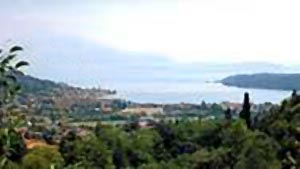
A view across Lake Garda |
In mid-September of 1937 I was vacationing at Lake Garda when my mother wrote me this bit of gossip: “Imagine, Anne N. died. She lost her life in an
automobile accident. She was buried yesterday in M. cemetery.”
I was shocked by the news. I knew that Anne had never been very religious. Was she prepared when God called her suddenly from this life? The next morning I assisted at Mass in the chapel of the convent boarding house where I was rooming. I prayed fervently for the eternal rest of her soul and offered my Holy Communion for that intention.
Throughout the day I was unsettled, and that night I slept fitfully. Once, I awoke suddenly, hearing something that sounded like my door being opened. Startled, I turned on the light, noting that the time on the clock on my nightstand showed ten minutes after midnight. The house was quiet and I saw nothing unusual. The only sound was from the waves of Lake Garda breaking monotonously on the garden wall. There was no wind. Nonetheless, I thought I heard something else after the rattling of the door, a swooshing sound like something being dropped. It reminded me of when my former office manager was in a bad mood and dropped some problem papers on my desk for me to resolve.
Should I get up and look around? I wondered. But since all remained quiet, it didn’t seem worthwhile. It was probably just my imagination, somewhat overwrought by the news of the death of my friend. I rolled over, prayed several Our Fathers for the Poor Souls in Purgatory, and returned to sleep. I then dreamed that I arose at six to go to morning Mass in the house chapel.
Upon opening the door of my room, I stepped on a parcel containing the pages of a letter. I picked it up and recognized Anne’s handwriting. I cried out in fright. My fingers trembled, and my mind was so shaken I couldn’t even think to say an Our Father. I felt like I was suffocating, and needed open air to breathe. I hastily finished arranging myself, put the letter in my purse, and rushed from the house.

"I sank to the ground on the riverbank between two cypress trees" |
Once outside, I followed a winding path up through the hills, past the olive and laurel trees and the neighboring farms, and then on beyond the famous Gardesana highway. The day was breaking with the brilliant light of the morning sun. On other days, I would stop every hundred steps or so to marvel at the magnificent view of the lake and beautiful Garda Island. The sparkling blue tones of the water delighted me, and like a child gazing with awe at her grandfather, I would gaze with admiration upon the ashen-colored Mount Baldo that rose some 7,200 feet above the opposite shore of the lake.
On this morning, however, I was oblivious to everything around me. After walking a quarter of an hour, I sank mechanically to the ground on the riverbank between two cypress trees where only the day before I had been happily reading a novel, Lady Teresa. For the first time I looked at the cypress trees conscious of them as symbols of death, something I had taken no notice of before, since these trees are quite common here in the south.
I took the letter from my purse. There was no signature, but it was, beyond any doubt, the handwriting of Anne. There was no mistaking the large, flowing S or the French T she made that used to irritate Mr. G. at the office. It was not, however, written in her usual style of speaking, which was so amiable and charming, like her, with those blue eyes and elegant nose. Only when we discussed religious topics did she become sarcastic and take on the rude tone and agitated cadence of the letter I now began to read.
Here, word for word, is the Letter from Beyond of Anne V. as I read it in the dream.

Letter from Beyond
Claire!
Do not pray for me. I am damned. Do not think that I am telling you this and certain circumstances and details about my condemnation as a sign of friendship. Here we no longer love anyone. I do it on the command of “that power that never desires Evil and always does Good.”
In truth, I would like to see you here where I will remain forever. (2)
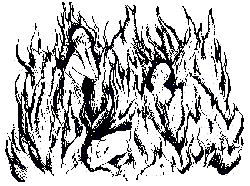
"Here [in Hell] we no longer love anyone" |
Do not be surprised that I should say this. We all think the same way here. Our will is hardened in evil - in what you call “evil.” Even when we do something “good,” as I do now in opening your eyes about Hell, it is not with any good intention.(3)
1. The poll was taken by the Oxnard-based Barna Research Group, an independent marketing research firm, which interviewed 1,000 adults nationwide during September, 2003. The margin of sampling error is plus or minus 3 percentage points. “The Pearly Gates … or Hell?” Connie Kang, Los Angeles Times, October 24, 2003.
2. Quoted in “Of May Things,” George M. Anderson, S.J., America, November 3, 2003.
3. 2. St. Thomas Aquinas, Summa Theologica, Suppl., Q. 98, art. 4: "Therefore, they [the damned] will wish all the good were damned."
4. In response to the Question whether every act of the will in the damned is evil, St. Thomas distinguishes the deliberate will and the natural will: “Their natural will is theirs not of themselves but of the Author of nature, Who gave nature this inclination which we call the natural will. Wherefore since nature remains in them, it follows that the natural will in them can be good.
“But their deliberate will is theirs of themselves, inasmuch as it is in their power to be inclined by their affections to this or that. This will is in them always evil: and this because they are completely turned away from the last end of a right will, nor can a will be good except it be directed to that same end. Hence even though they will some good, they do not will it well so that one is not able to call their will good on that account.”
Ibid., Q. 98, a. 1.

Posted November 24, 2003

This article
continues in the booklet
The Letter From Beyond

|
Faith under Attack | Religious |
Home | Books | CDs
| Search | Contact Us
| Donate

© 2002-
Tradition in Action, Inc. All Rights Reserved
|
 |
|